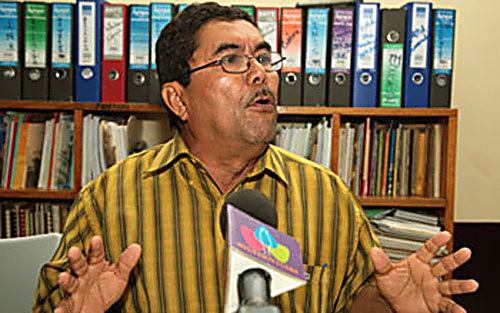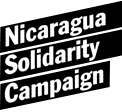Talking with Domingo Pérez, Nicaraguan trade union leader
NSCAG News |
| credit: The Prisma
on: Monday, 20 June 2011
Origional source: Click here for original article

Domingo Pérez
The secretary-general of the UNE in Nicaragua will be in the UK until Jun 25th. His purpose is to strengthen the links with British trade unions and give his support and solidarity at this time of crisis for workers in this country.
Ivan Gunchev
It is probably during infancy that the most long-lasting impressions are laid down in everyone’s heart. Dedication, commitment, education and work from a young age are the indices of how a person will be many years later.
Although this theory is not laways true, we can say that in the case of Domingo Francisco Peréz it is completely correct.
The present Secretary-General of the Unión Nacional de Empleados (UNE) in Nicaragua began his path of struggle and labour at an early age. When he was 7 he shared food with his older sister to help to maintain their large family. Later at age 13 he trained and worked as a shoe-maker, in order to continue helping his mother to support the family.
While working like this he studied and qualified as an accountant. Later he worked in a bank and joined the UNE in 1980. Some years later he qualified in Administration and Business Management, and recently he has graduated as a lawyer and notary and is registered with the Supreme Court of Justice of the Republic of Nicaragua.
The variety and abundance of his training in all these areas serves as a great help, allowing him to contribute to different kinds of work with the unions and their affiliates in Nicaragua.
But besides his extensive academic training, there is one of Domingo’s qualities that stands out, something that has grown from the very beginning: the passion and conviction he dedicates to his work.
This is precisely the reason for his third visit to the UK at the invitat ion of the Nicaragua Solidarity Campaign (NSC). Between the 14th and 25th of June, Domingo will meet English and Welsh trade union colleagues in the cities of London, Bristol, Cardiff and Manchester. He will take part in meetings with the aim of further developing solidarity and brotherhood between unions and ratifying the links of cooperation and friendship.
The Prisma has spoken to him in order to have a better idea of how things are in Nicaragua, free from the filters imposed by the mass media.
There will be elections in Nicaragua on the 6th November this year. What is the situation of the present president, Daniel Ortega in the run-up to these elections at the end of the year ?
It can be said that Daniel Ortega has both the legal right and the political legitimacy to offer himself as a candidate for the presidency in the November elections. On the one hand, from a legal point of view, the Supreme Court has granted him the option of presenting himself at the ballot-box as a presidential candidate. On the other hand the Frente Sandinista (FS) has confirmed him as the person chosen to represent its values and identity, that is to say, the party of the workers, the poor and the excluded.
What are the present predictions for the outcome of the elections ?
According to the pre-electoral opinion polls 48% intend to vote for Ortega at the moment. In the months that remain the FS will certainly increase this by 10%, taking into account the voters who are still undecided.
We believe that the FS can win 50 to 55% of the votes of the electorate. This points towards an absolute majority, or if not then a relative majority sufficient to allow the government to continue making laws aimed at improving the conditions of the poor.
What do you think about the rumours of corruption which are circulating about Ortega ?
Really, I don’t know what corruption they are talking about. There exist various projects, like Usura Zero (interest-free loans), the programme to improve living conditions, or productivity bonds, etc. There are social programmes for women who have not had work for 17 years because of the exclusive neo-liberal policies of previous governments.
More than 150,000 workers have received a socialist, Christian and solidario benefit of 36 dollars a month. Between May 2010 and May 2011 the government provided 47 million dollars to the workers. The people have received these funds as well as homes, and free health and education services. These are the services that were privatized by the three previous neo-liberal governments. If this is what they call corruption, then I believe the people are going to vote for this corruption again on November 6th.
So this is just a campaign of slander to attack the president’s legitimacy ?
I believe there is a dirty campaign against Ortega led by the oligarchy of the church and the privileged class that existed and still exists in Nicaragua. What this campaign is about is the fight for power, it represents the class struggle between the haves and have-nots.
What is the situation regarding unempoyment in Nicaragua, and how has it changed in recent years ?
The government of comrade Daniel faced a situation in which 1,200,000 Nicaraguans were out of work in 2007, more than 60% of the economically-active population. There are also 300,000 who are self-employed selling things on the street or wherever they can.
The most disturbing figures are those showing that 80% of the population, 4.8 million people are in a state of poverty, half of whom are in a state of extreme poverty, meaning that they have less than 1 dollar a day to live on.
The present governments is working to make sure that the people have a regular income, enough to support a family and their basic needs. It is crucial to develop the national economy to generate employment: these two macro-economic variables are directly proportional.
How has the Financial Crisis affected Nicaragua ?
The world financial crisis in 2008 has indeed had an impact here. It has shown that the famous Economy of Bubbles does not generate wealth or profitability. What does generate it is productivity and added value, things which require investment.
The system of crude neo-liberal capitalism has shown that it does not respond to the needs of the world, but only to those of multinational companies and the rich who control 60% of the wealth of the world.
In Nicaragua austerity policies have been applied which have not allowed the crisis to impact with the same force as it has in Europe, the USA and the rest of the world.
How does the Labour Movement in Nicaragua compare, for example, with those in other Latin-American countries ? Is there repression of the leaders or the members ?
In Nicaragua this level of oppression against union members does not exist now, like it does in Colombia or Guatemala. Previously, during the three neo-liberal governments of Violetta Chamorro, Alemán and Bolaño there were attacks and sackings. More than 15,000 union leaders in different sectors, and 285,000 of their members in the public sector were on the run from the police.
Today, and since 2007 the unions are in the front line. They are the chief beneficiary of the policies of the government. Rights of joining unions and of free association are respected, as is collective bargaining, and the opportunity for women and young people to form unions. This latter is important for creating the base for generational renewal of the unions. Today Nicaragua can be considered as an example for the rest of Latin America in this field.
What place does the labour movement occupy in Nicaraguan society ?
We intend to form part of a unity joined to all the other sectors of society. We are on both sides, we are the union between the government and the people.
At the moment we are in support of the public administration, because this is resolving the problems of the labour force, working for stability of employment, and making collective agreements etc. An example is the workers in the civil service who do not belong to the Sandinista Party, but have been guaranteed stable employment despite the change of government, so their rights are being respected.
What do you think of the change of direction in Latin-American politics in the last 8 years ? Is it a logical development that will continue, or on the contrary, is it possible that the ghots of the past will return ?
This is all an outcome of the class struggle. In Latin-America the Right is on the side of the rich , and the Left is with the poor. In Brazil, Argentina, Venezuela and Ecuador, governments of the Left are showing that it is possible to govern by social policies, and not with policies of the IMF which don’t help the people to move forward in the long term.
The most recent example is the victory of Ollanta Humala in Peru. It isn’t a question of a boom among governments of the left, but it is happening because they have shown that there is an alternative different from the Right, an alternative which solves the problems of the working class and the poor.
What do you think of the present situation in the UK, with the plan of cuts to social services ?
In the first place, in the UK, it has become clear how the parties of the Right in every country collude with the oligarchies and succeed in implementing these kinds of laws which cause social exclusion. It is not possible to destroy the welfare state, the way it happened in Nicaragua in 1990. They destroyed all the benefits that Nicaraguans used to have.
Today they are doing the same thing with the work security of UK citizens. So I believe that the British trade unions, which are very strong, must unite and fight against these injustices. The labor movement has to become the spearhead in the struggle against these exclusive policies which privilege a few and worsen the situation of most of the population.
And what do you think about what has happened in Spain, where the Indignados of the 15-M movement have taken to the streets to protest and demand a change of the system ?
The movement of the Indignados in Spain is protesting against a neo-liberal and exclusive system which does not solve the problems of society. We have to transform this system into an economic model based on justice and equality, where all of us have a decent job and a respectable life in our social family. We, as a union movement, have to support them in making these transformations. The dialectic has shown that no economic or social structure is static. There have been many changes, through feudalism, slavery, communism and now capitalism. Now it is time for capitalism to disappear.
(Translated by Graham Douglas – Email: ondastropicais@yahoo.co.uk)





